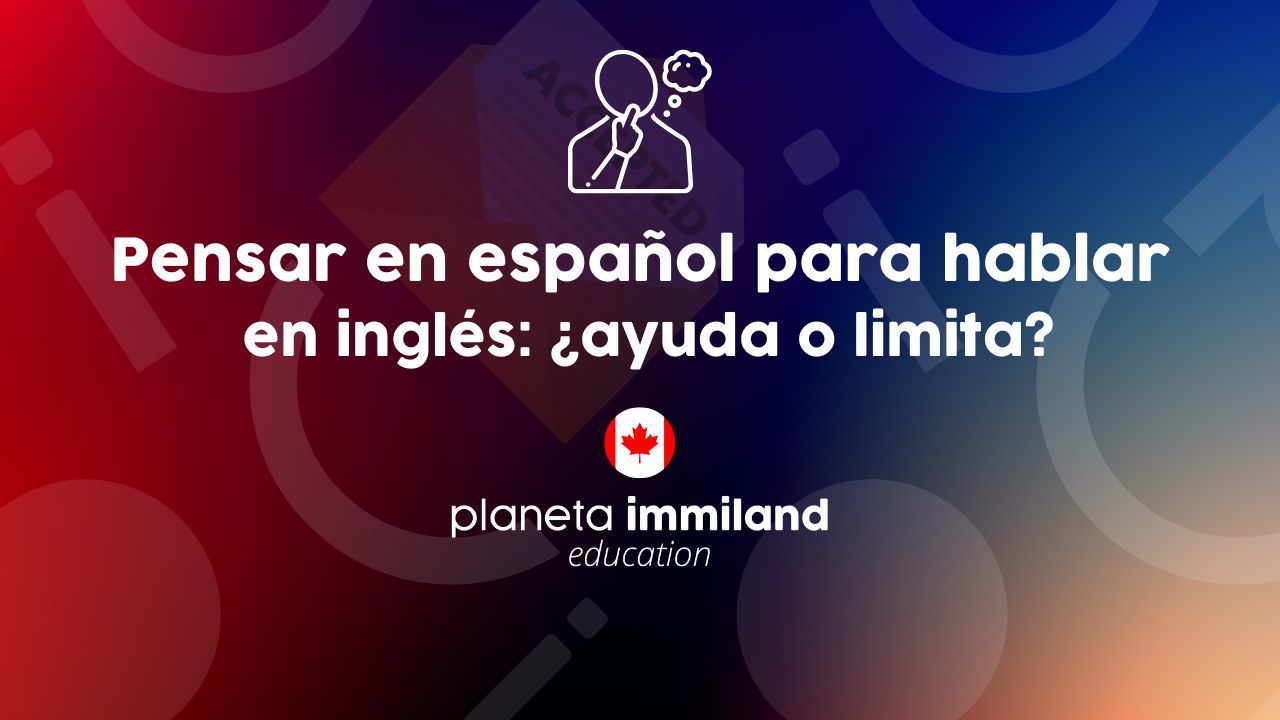Thinking in Spanish to speak English: helpful or limiting?
Sep 19, 2025
Written by Gabriela Estrada
Learning English goes beyond memorizing vocabulary or mastering grammar. For many Spanish speakers, the real challenge comes when they try to speak fluently and realize that they are still thinking in Spanish. they are still thinking in Spanish.. But is this an obstacle, or can it be a useful tool if you know how to use it?
In this blog, you will learn how thinking in Spanish influences in English oral production, when to translate mentally, and when it's best to "change the chip. You'll also find strategies for moving towards more natural communication and online courses to help you learn. Let's get started!
Thinking in Spanish when speaking English: how does it evolve at each level?
Thinking in Spanish when speaking English is completely natural, especially when starting from scratch.especially when starting from scratch. Spanish is our base language: it's how we organize ideas, emotions and memories. That's why, when learning English as a second language, the most common thing to do is to translate mentally before speaking.
English from zero or beginner's level
In the initial levels (A1-A2), this translation is constant. The student thinks in Spanish, looks for word-for-word equivalences and constructs sentences from his or her native language. This can generate errors as in these cases: "I'm going to look for my son → I'm going to look for my son (grammatically correct, but unnatural; the usual would be I'm picking up my son).
At this stage, thinking in Spanish is not a mistake, but a support tool.but a supportive tool. But if it is kept too long, it can slow down fluency, it can slow down fluency and make it difficult to use English spontaneously.
Intermediate English
As one advances to the intermediate level (B1-B2), thinking in Spanish begins to decrease.. The student already recognizes common structures in English, has more functional vocabulary, and begins to form sentences directly in the new language. There may still be interference, but processing time is reduced.
Advanced English
At advanced levels (C1-C2), English becomes part of the thinking. You no longer need to translate. Ideas are expressed directly in English, idiomatic expressions are understood and responses are natural. Spanish is still present, but it is no longer is no longer the main filter.
This change occurs through constant exposure to constant exposure to English (listening, reading, interacting), frequent oral pFrequent oral practice, which forces the brain to operate in English, and frequent oral practice, which forces the brain to operate in English.which forces the brain to operate in English, and communicative confidence. communicative confidencewhich allows you to make mistakes without getting blocked.
When does it help to think in Spanish?
In initial levels, thinking in Spanish can be useful for organizing to organize ideas, remember vocabulary and build sentences calmly. Thinking in Spanish functions as a bridgebut it should not be the final destination.
When do you limit thinking in Spanish?
As you go along, thinking in Spanish can lead to errors if you try to if you try to translate structures that do not exist in English. Phrases such as "Me hace falta" or "Se me olvidó" have no direct equivalents. Trying to say It makes me lack o It forgot to me doesn't work.
In addition, mental translation is time-consuming, mental translation is time-consuming. In a real conversation, there is no room to stop and look up every word. That is why thinking directly in English allows you to respond more naturally and confidently, thinking directly in English allows you to respond more naturally and confidently..
Training thinking in English with Planeta Immiland
Thinking English starts with training, strategically designed courses and conversation clubs. That's why at Planet Immilandthe process is built from the ground up, with online English courses designed especially for Spanish speakers who want to leave mental translation behind and start thinking in English.
Discover our online English courses.
Planeta Immiland's programs cover zero to advanced levels, with a focus on conversation, vocabulary useful for life in Canada, and strategies to train thinking in English. In addition, they carry the Languages Canadawhich certifies their quality for studying, working or traveling to English-speaking countries.
As a practical complement, students have access to the Conversation Cluban exclusive space where they can apply what they have learned in real situations, without pressure and with professional accompaniment. Here, spontaneous spontaneous thinking in English in English, gain confidence and consolidate what is studied in class.
Thinking in Spanish is the beginning. Thinking in English is the way. Speaking fluently is the goal.. I hope this topic will help you rethink the way you speak English.
Thanks for reading, see you soon!
With love,
Planet Immiland
Not sure about your level of English or French? Don't worry!
At Planeta Immiland Education we offer a free online placement test to help you find out your language level and design a personalized study plan for you. Find out your English or French level in a few minutes and start improving your language skills today!
Subscribe to our mailing list.
Leave us your contact information to learn more about our courses, tips, and promotions.


